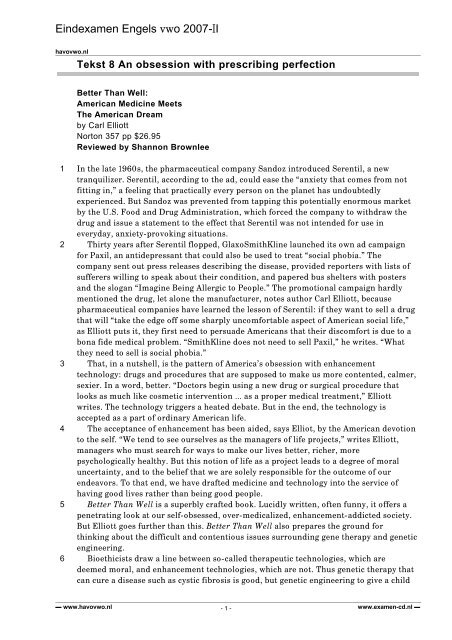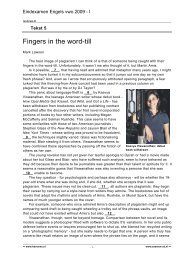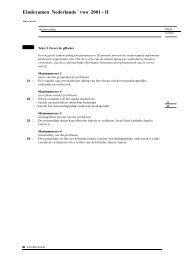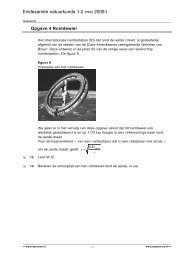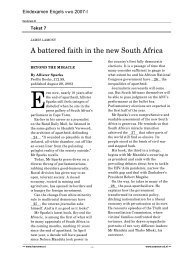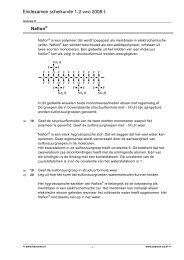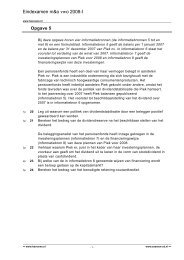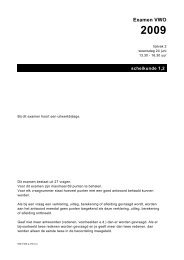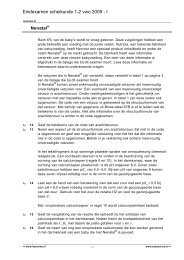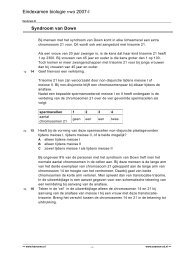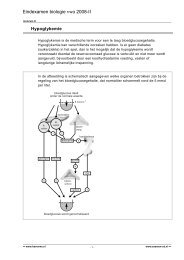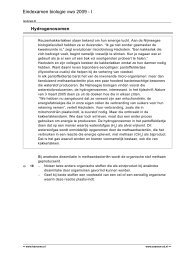Eindexamen Engels vwo 2007-II - VWO-Examens
Eindexamen Engels vwo 2007-II - VWO-Examens
Eindexamen Engels vwo 2007-II - VWO-Examens
You also want an ePaper? Increase the reach of your titles
YUMPU automatically turns print PDFs into web optimized ePapers that Google loves.
<strong>Eindexamen</strong> <strong>Engels</strong> <strong>vwo</strong> <strong>2007</strong>-<strong>II</strong><br />
havo<strong>vwo</strong>.nl<br />
Tekst 8 An obsession with prescribing perfection<br />
Better Than Well:<br />
American Medicine Meets<br />
The American Dream<br />
by Carl Elliott<br />
Norton 357 pp $26.95<br />
Reviewed by Shannon Brownlee<br />
1 In the late 1960s, the pharmaceutical company Sandoz introduced Serentil, a new<br />
tranquilizer. Serentil, according to the ad, could ease the “anxiety that comes from not<br />
fitting in,” a feeling that practically every person on the planet has undoubtedly<br />
experienced. But Sandoz was prevented from tapping this potentially enormous market<br />
by the U.S. Food and Drug Administration, which forced the company to withdraw the<br />
drug and issue a statement to the effect that Serentil was not intended for use in<br />
everyday, anxiety-provoking situations.<br />
2 Thirty years after Serentil flopped, GlaxoSmithKline launched its own ad campaign<br />
for Paxil, an antidepressant that could also be used to treat “social phobia.” The<br />
company sent out press releases describing the disease, provided reporters with lists of<br />
sufferers willing to speak about their condition, and papered bus shelters with posters<br />
and the slogan “Imagine Being Allergic to People.” The promotional campaign hardly<br />
mentioned the drug, let alone the manufacturer, notes author Carl Elliott, because<br />
pharmaceutical companies have learned the lesson of Serentil: if they want to sell a drug<br />
that will “take the edge off some sharply uncomfortable aspect of American social life,”<br />
as Elliott puts it, they first need to persuade Americans that their discomfort is due to a<br />
bona fide medical problem. “SmithKline does not need to sell Paxil,” he writes. “What<br />
they need to sell is social phobia.”<br />
3 That, in a nutshell, is the pattern of America’s obsession with enhancement<br />
technology: drugs and procedures that are supposed to make us more contented, calmer,<br />
sexier. In a word, better. “Doctors begin using a new drug or surgical procedure that<br />
looks as much like cosmetic intervention … as a proper medical treatment,” Elliott<br />
writes. The technology triggers a heated debate. But in the end, the technology is<br />
accepted as a part of ordinary American life.<br />
4 The acceptance of enhancement has been aided, says Elliot, by the American devotion<br />
to the self. “We tend to see ourselves as the managers of life projects,” writes Elliott,<br />
managers who must search for ways to make our lives better, richer, more<br />
psychologically healthy. But this notion of life as a project leads to a degree of moral<br />
uncertainty, and to the belief that we are solely responsible for the outcome of our<br />
endeavors. To that end, we have drafted medicine and technology into the service of<br />
having good lives rather than being good people.<br />
5 Better Than Well is a superbly crafted book. Lucidly written, often funny, it offers a<br />
penetrating look at our self-obsessed, over-medicalized, enhancement-addicted society.<br />
But Elliott goes further than this. Better Than Well also prepares the ground for<br />
thinking about the difficult and contentious issues surrounding gene therapy and genetic<br />
engineering.<br />
6 Bioethicists draw a line between so-called therapeutic technologies, which are<br />
deemed moral, and enhancement technologies, which are not. Thus genetic therapy that<br />
can cure a disease such as cystic fibrosis is good, but genetic engineering to give a child<br />
▬ www.havo<strong>vwo</strong>.nl - 1 -<br />
www.examen-cd.nl ▬
<strong>Eindexamen</strong> <strong>Engels</strong> <strong>vwo</strong> <strong>2007</strong>-<strong>II</strong><br />
havo<strong>vwo</strong>.nl<br />
greater intelligence is bad. The problem with this construction, as Elliott makes clear, is<br />
that the distinction between treatment and enhancement gets a little blurry in a society<br />
that has become adept at turning many aspects of ordinary life into medical problems. Is<br />
it enhancement to give growth hormone to increase the stature of boys who will achieve<br />
below-average height? Or therapy to protect their egos? And once biotechnologists find<br />
the genes for stature, will we want to ensure that all our sons are above average and all<br />
our daughters do not grow too tall?<br />
7 The ability to alter the genes in embryos is coming soon to a culture that sees selfexpression<br />
and identity as commodities that can be purchased. The implication of this<br />
eloquent, disturbing book is that it will be very difficult to stop genetic enhancement, or<br />
even slow it down.<br />
The Washington Post<br />
▬ www.havo<strong>vwo</strong>.nl - 2 -<br />
www.examen-cd.nl ▬
<strong>Eindexamen</strong> <strong>Engels</strong> <strong>vwo</strong> <strong>2007</strong>-<strong>II</strong><br />
havo<strong>vwo</strong>.nl<br />
Tekst 8 An obsession with prescribing perfection<br />
1p 28 Which of the following statements is in accordance with the contents of<br />
paragraphs 1 and 2?<br />
Serentil had to be taken off the market, because<br />
A it did not remedy the social anxiety it was supposed to ease.<br />
B it was not seen as treating a real disorder.<br />
C the advertising campaign for Serentil met with a lot of opposition.<br />
D users of Serentil complained of serious side-effects.<br />
1p 29 What does paragraph 2 make clear about the “GlaxoSmithKline” ad campaign?<br />
A It concentrated on putting anxiety on the map as a disease.<br />
B It highlighted the wide range of psychological disorders treatable with Paxil.<br />
C It portrayed sufferers from social anxiety who had benefited from Paxil.<br />
D It was not launched until social anxiety had been recognised as a medical<br />
condition.<br />
“The technology triggers a heated debate.” (paragraph 3)<br />
1p 30 A debate between which of the following parties?<br />
A Advocates and opponents of medical science being taken over by<br />
technology.<br />
B People in favour of and people against treatment merely aimed at a happier<br />
life.<br />
C People who suffer from social phobia and those who do not.<br />
D Pharmaceutical companies and the U.S. Food and Drug Administration.<br />
E The medical profession and pharmaceutical companies.<br />
2p 31 Geef van elk van de onderstaande beweringen aan of deze wel of niet in<br />
overeenstemming is met de inhoud van alinea 4.<br />
1 Americans tend to hold themselves accountable if they do not lead<br />
successful lives.<br />
2 Becoming a better person is part of America’s obsession with perfection.<br />
3 Many Americans see tranquillisers as a relief from the pressures of work.<br />
4 Present-day American medical science seems hardly interested anymore in<br />
ordinary diseases.<br />
Noteer het nummer van elke bewering, gevolgd door “wel” of “niet”.<br />
1p 32 Which of the following is in accordance with the contents of paragraph 5?<br />
A Elliot approves of gene therapy but disapproves of drugs for the purpose of<br />
making us happier.<br />
B Elliot argues that gene therapy will gradually replace medication.<br />
C Elliot extends his reasoning about enhancement technology to the field of<br />
gene therapy.<br />
▬ www.havo<strong>vwo</strong>.nl - 3 -<br />
www.examen-cd.nl ▬
<strong>Eindexamen</strong> <strong>Engels</strong> <strong>vwo</strong> <strong>2007</strong>-<strong>II</strong><br />
havo<strong>vwo</strong>.nl<br />
1p 33 What does paragraph 6 make clear about the distinction that bioethicists have<br />
made?<br />
A It can generate useful guidelines for tackling tricky moral questions.<br />
B It does not prevent them from constantly shifting their position.<br />
C It has led to a great deal of argument among scientists.<br />
D It is not always applicable to developments in medical practice.<br />
1p 34 Which of the following sums up the reviewer’s attitude towards enhancement<br />
technology?<br />
It is<br />
A controversial but promising.<br />
B worrying but unavoidable.<br />
C wrongly ignored but irreversible.<br />
▬ www.havo<strong>vwo</strong>.nl - 4 -<br />
www.examen-cd.nl ▬


